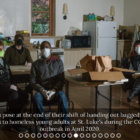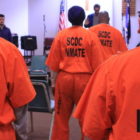
Reforming Juvenile System For Girls Requires Stories, Three Experts Say
|
A pregnant teenager stands alone in a cinder-block cell in one image. In another, a young body shivers, curled up in an oversized T-shirt huddled in the far corner of a cold cement room. The pictures are just a few of the thousands in a collection by Richard Ross, who uses his photography as a vehicle to highlight the needs of the estimated 48,000 children in custody each day. Ross has documented the lives of young people caught up in the juvenile justice system in Juvenile-in-Justice, a project he founded to connect human faces to a story often told in terms of cold statistics.
“My whole focus for the last 15 years has been interviewing these kids and being a co-conspirator with them in terms of trying to be the conduit for their voice,“ he said. Ross was one of three juvenile justice experts on a webinar hosted Tuesday by the Dui Hua Foundation as part of a series focused on unique issues girls face when they come into conflict with the legal system.








